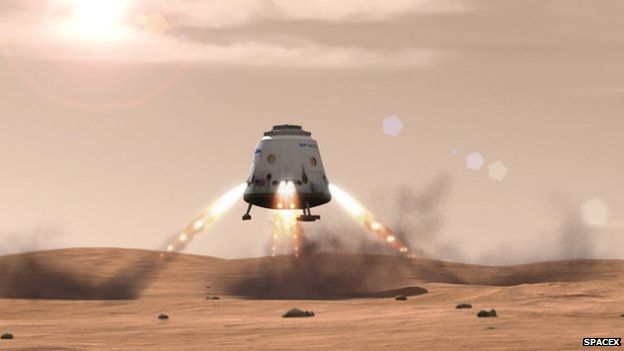Mars for the 'average person'
-
Published
-
comments

Rocket entrepreneur Elon Musk believes he can get the cost of a round trip to Mars down to about half a million dollars.
The SpaceX CEO says he has finally worked out how to do it, and told the BBC he would reveal further details later this year or early in 2013.
Musk is one of Nasa's new commercial partners, building systems to take cargo and crew to the space station.
He has developed his own rocket and a capsule for the purpose.
The Falcon 9 launcher and the Dragon vessel are expected to give the first full demonstration of their capabilities next month on an unmanned sortie to the orbiting outpost.
Elon Musk describes his Mars vision in Scott's Legacy, a BBC Radio 4 programme presented by Kevin Fong. The programme examines the future of exploration.
It can be heard on iPlayer but you can also listen to Kevin's extended interview with the SpaceX chief on this page.
Elon Musk: Rockets must be "completely and rapidly reusable"
In the discussion, the California entrepreneur says key technology breakthroughs are dramatically lowering the cost of space access to the point where a mission to the Red Planet will very soon become a realistic financial prospect.
"My vision is for a fully reusable rocket transport system between Earth and Mars that is able to re-fuel on Mars - this is very important - so you don't have to carry the return fuel when you go there," he said.
"The whole system [must be] reusable - nothing is thrown away. That's very important because then you're just down to the cost of the propellant.
"We will probably unveil the overall strategy later this year in a little more detail, but I'm quite confident that it could work and that ultimately we could offer a round trip to Mars that the average person could afford - let's say the average person after they've made some savings."
The entrepreneur described this as about half a million dollars. He conceded the figure was unlikely to be the opening price - rather, the cost of a ticket on a mature system that had been operating for about a decade. Nonetheless, Musk thought such an offering could be introduced in 10 years at best, and 15 at worst.
"Land on Mars, a round-trip ticket - half a million dollars. It can be done," he asserts.
Leaving aside how one might define the wealth of an "average person", this is quite a claim.
To put it in some context - Nasa itself is commissioning its own rocket and capsule system from more established aerospace companies that the agency expects eventually to use on Mars missions.
Few elements of this multi-billion-dollar system will be re-useable and its maiden manned flight - probably a loop around the Moon - may not occur until the early 2020s. A Nasa-led manned mission to the Red Planet is unlikely to happen until the 2030s, and that could be optimistic.
There will be some who will see Elon Musk's latest remarks as little more than bluster. After all, SpaceX still has much to prove in the here and now.
It has still only ever launched a rocket seven times, and the first three failed. That space station re-supply mission has also repeatedly slipped on its schedule, say the doubters. Space is difficult and SpaceX has yet to show it has suddenly become easy, they add.
Even so, Nasa itself is expecting big things from Musk's team, and is pushing Congress to release more money in 2013 to seed the development of commercial spaceflight systems like those from SpaceX.
In his BBC interview, Musk talks about the importance of his Falcon 9-Heavy vehicle.
This rocket will be substantially bigger than the simple variant due to fly next month, and should be capable of putting more than 53 tonnes (117,000lb) of payload in a low-Earth orbit - more than twice that of the space shuttle.
Musk believes the Falcon Heavy will be transformative because it will substantially reduce the cost of carrying a given mass into space - breaking the barrier of $1,000 per pound lifted.
He cites the advanced design of its structure, its avionics, its engines and its launch operation as important contributions to the template of low cost. But it will be by making this vehicle totally reusable, by recovering all its parts to put back on the launch pad, that will ultimately slash the cost of space access, he contends.
"If you had to buy a new plane every time you flew somewhere, it would be incredibly expensive," Musk says.
"A 747 costs something like $300m and you'd need two of them to do a round trip. And yet people aren't paying half a billion dollars to fly from LA to London, and that's because that 747 can be used tens of thousands of times.
"We must get to the same position in rocketry. That's really what's critical; in order to get a two orders of magnitude improvement beyond Falcon Heavy (in other words to get down to the $10 or $20 per pound to orbit range), you have to have high levels of reusability.
"You need to be in the position where it is the cost of the fuel that actually matters and not the cost of building the rocket in the first place."
This episode of Scott's Legacy was first broadcast on BBC Radio 4 on Tuesday 20 March, and is repeated on Thursday 22 March at 21:02 GMT. It is also available on the iPlayer.
-
-
Published19 July 2011
-
-
-
Published29 April 2011
-
-
-
Published10 May 2011
-
-
-
Published8 December 2010
-
-
-
Published5 April 2011
-
-
-
Published8 December 2010
-